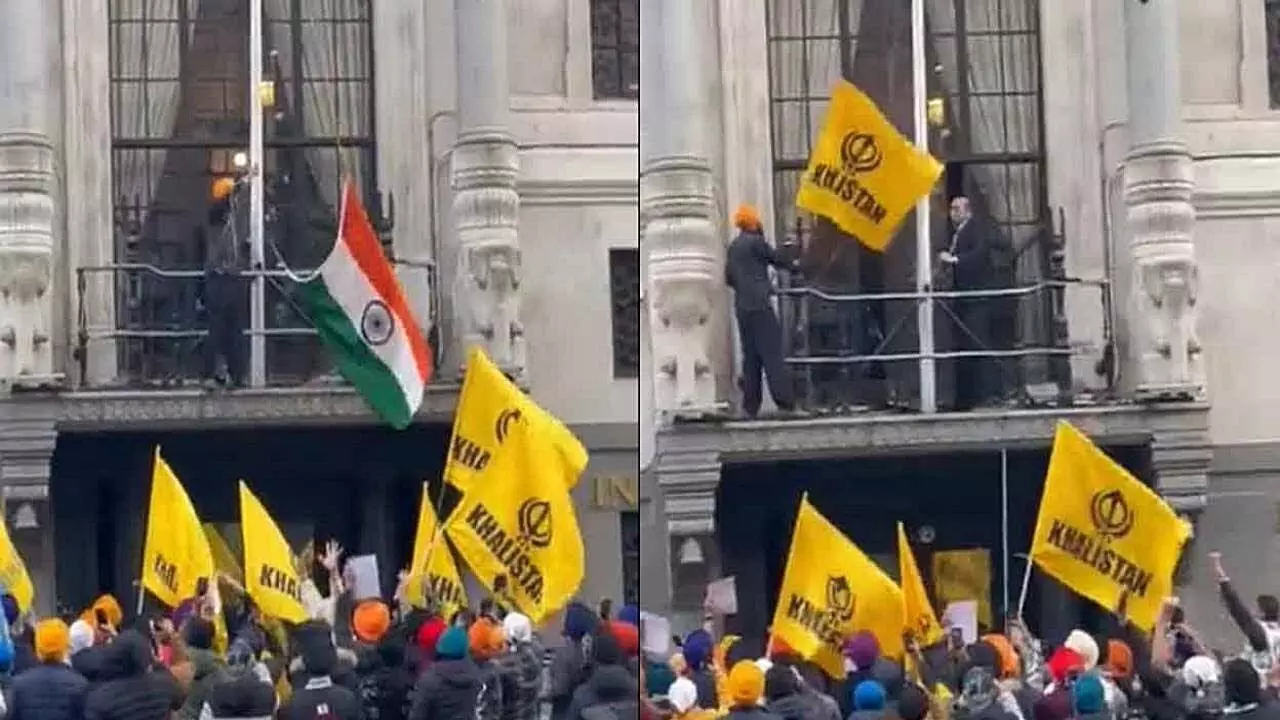A pressing problem
Addressal of security concerns arising out of the resurgence of separatist elements, both within and outside India, must be accorded high priority

Recent disturbances, related with attempts to create a separate State for the Sikhs, certainly call for alarm and immediate redressal. The task is twofold. Firstly, handling the complex situation in the State of Punjab which has witnessed dramatic developments over the past months after Amritpal Singh hogged the spotlight by engaging the authorities into a showdown and now making a dramatic escape from the huge dragnet of the Punjab police. Secondly, addressing the problems outside India where pro-Khalistani elements “succeeded” in bringing down the Indian flag from diplomatic missions, notably in London, San Francisco, Brisbane, and other places. In London, the mischievous persons even replaced the Indian tricolour with a Khalistani flag. This raises several concerns regarding the security of the heavily guarded Indian missions as well as security provided by the host police. Clearly, in London, the local police failed miserably in preventing the Khalistani hooligans in physically accessing the Indian High Commission premises and bringing down the Indian flag. However, credit to the alacrity shown by the Indian security guards, posted in the mission itself, they re-hoisted the flag amid a handful of Khalistani activists congregating on the ground and chanting unsavoury slogans.
This incident also exhibits a complete lack of coordination between concerned officials of the British Home Office and their Indian counterparts. Ordinarily, the host authorities collect hard, preventable intelligence from local sources and forewarn the Indian High Commission so that a joint vigil is maintained and miscreants are prevented from carrying out any act of vandalism. Sadly, this is a poor reflection on the intelligence machinery, mainly on the part of the British side, which could not prevent the unpleasant happening. This was beamed the world over with disturbing footages, coupled with massive propaganda, which is perhaps a boost to the miniscule number of Khalistan supporters — more significantly to the anti-India forces , including Pakistan’s security and intelligence agencies. Same story has been repeated in the US and Australia. Again, the responses from the host sides were most unprofessional and undesirable, to say the least. In this context, I have no hesitation in sharing that during my posting as a security and liaison officer on a particular mission abroad in the early 1980s, there was perfect coordination with the host agencies and, invariably, there were advance warnings from the local authorities. Accordingly, we beefed up our security, foiling the demonstrations staged by hostile quarters on different issues. It is expected that in these days of technological advancements, with sophistication, better facilities, and coordination with foreign countries, intelligence would be available at hand and such occurrences would be put to a complete halt. It is, therefore, very surprising that such condemnable incidents are happening when, at the government levels, these countries are very warm to each other with maximum cooperation, as far as optics and media coverage are concerned. Hence, it is important to re-launch a robust diplomatic effort with closer liaison to do away with these separatist-linked happenings.
Now, it is equally important to expose to the international community the role of Pakistan and its notorious Inter-services Intelligence (ISI) for their renewed attempts to try and revive the Khalistani issue. It is a well-known fact that the ‘Khalistan’ revival was initiated by Pakistan as early as the early 1980s, and that led to large-scale violence lasting for many years in the State of Punjab, disturbing the tranquility and peace for a long period. As already chronicled in these columns, there seems to be a clear-cut plan by the ISI to touch the bordering state of Punjab by fueling the Khalistani agitation as well as drawing in certain outfits from Canada, the UK, the US, Australia etc. to pitch in for anti-India activities. This is also designed by the Pakistani establishment to divert attention from its own internal problems which are threatening it with devastating consequences. To combat such menace, it is worth reiterating that:
i) Intelligence at local, state, Central and foreign agencies should coordinate well;
ii) More muscular diplomacy should be pursued, with the concerned countries putting maximum pressure to contain these rudderless elements; and
iii) A no-nonsense approach in dealing with Amritpal and his followers belonging to Waris de Punjab should be adopted.
Unfortunately, this is not happening on the ground. This is evident from the laxity on part of the Punjab police administration as, despite massive deployment of police force, Amritpal Singh could “dodge and elude” the strong deployment and flee to an unknown destination. Punjab police have always been known for their action-oriented tasks, and in the 1960s, with the dynamic police leadership, the killer of the then Chief Minister Pratap Singh Kairon, Sucha Singh, was arrested from Nepal. What ails the valiant police force now?
Punjab police should now take the lead in coordinating with all the agencies within and outside India to contain the trend of ongoing disturbing developments. This is imperative so as not to allow emergence of another situation, as was witnessed in the 1980s which saw a spate of killings, derailment of law and order and other pitfalls dragging Punjab to regression. Basically, people of Punjab, whether staying within the State or outside, or even abroad, are peace loving and patriotic people.
The entire state machinery, in active collaboration with central agencies as well as with the foreign ministry, must gear up for vigorous diplomatic initiatives. Their spirit should not be allowed at any cost to be exploited by inimical and vested quarters. That is the need of the hour, and is doable, calling for a proactive action on a priority basis.
The writer is an IPS officer, Adviser NatStrat, security analyst and a former National Security Advisor in Mauritius. Views expressed are personal



